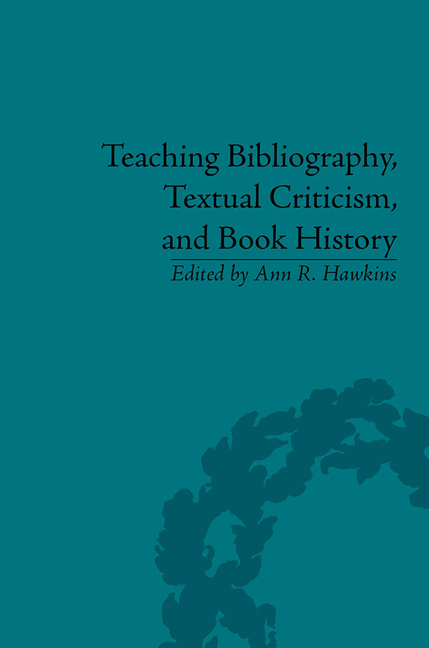Book contents
- Frontmatter
- Contents
- Notes on Contributors
- Foreword
- Introduction: Towards a pedagogy of Bibliography
- Part I Rationales
- Exploring the Archaeology of the Book in the Liberal Arts Curriculum
- Historical Bibliography for Rare-Book Librarians
- ‘A Clear and Lively Comprehension’: The History and Influence of the Bibliographical Laboratory
- Bookends: Towards a Poetics of Material Form
- Part II Creating and Using Resources
- Part III Methodologies
- Teaching ‘History of the Book’
- Teaching Bibliography and Research Methods
- Teaching Textual Criticism
- Part V Resources
- Index
Historical Bibliography for Rare-Book Librarians
from Part I - Rationales
- Frontmatter
- Contents
- Notes on Contributors
- Foreword
- Introduction: Towards a pedagogy of Bibliography
- Part I Rationales
- Exploring the Archaeology of the Book in the Liberal Arts Curriculum
- Historical Bibliography for Rare-Book Librarians
- ‘A Clear and Lively Comprehension’: The History and Influence of the Bibliographical Laboratory
- Bookends: Towards a Poetics of Material Form
- Part II Creating and Using Resources
- Part III Methodologies
- Teaching ‘History of the Book’
- Teaching Bibliography and Research Methods
- Teaching Textual Criticism
- Part V Resources
- Index
Summary
In 1912 W.W. Greg in a lecture to the Bibliographical society described ‘a dream of my own. It is of a course of lectures on English bibliography which may one day be delivered at one of our so-called seats of learning’. Although Greg's dream was not fulfilled as he envisaged, beginning in 1919 with Arundel Esdaile and extending through the present in what seems like an unbroken tradition, bibliographers – including Greg himself; Theodore Besterman of World Bibliography of Bibliographies fame; Frank (later sir Frank) Francis; and Howard Nixon (the latter two rare-book experts at the British Museum) – have lectured in bibliography at University College, London. Over the decades the course has developed from one focused on English textual bibliography and textual criticism into a more rounded history of the book.
However, the provision for teaching bibliography in all its aspects, or for teaching the history of the book in great Britain, is too slight, particularly for future rare book librarians. Some descriptive, analytical and textual bibliography is taught (but on the whole not to future librarians), and there are occasional one-off courses in printing history, descriptive bibliography, or, specifically, in rare books cataloguing. But as most Library Studies departments at British universities do not include anything like rare books studies or historical bibliography, much of what is needed to acquire, catalogue, preserve and give access to rare book collections, has to be learnt on the job. The fallacy that rare books cataloguing can be taught without also providing sufficient knowledge of analytical and descriptive bibliography, unfortunately means that, in Fredson Bowers's words: ‘books cannot be recorded accurately in libraries’. The future rare book librarian who wants to be trained in Britain has the choice between three main educational opportunities: one in Wales and two in london.
- Type
- Chapter
- Information
- Publisher: Pickering & ChattoFirst published in: 2014



